

MIC. Limited Equity Housing Co-op. Limited Equity Housing Cooperatives (LEHCs) are business corporations in which residents share ownership of a building.
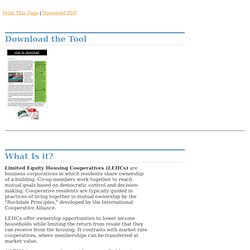
Co-op members work together to reach mutual goals based on democratic control and decision-making. Cooperative residents are typically guided in practices of living together in mutual ownership by the "Rochdale Principles," developed by the International Cooperative Alliance. LEHCs offer ownership opportunities to lower income households while limiting the return from resale that they can receive from the housing. It contrasts with market rate cooperatives, where memberships can be transferred at market value. A LEHC is one approach to resident-controlled housing. Limited Equity Housing Cooperatives: Build member participation in the corporation Operate as nonprofits Combine business and social goals Rely on democratic participation Create voluntary membership In the United States, there are more than 400,000 units of limited equity housing.
Last Updated: July 2001. Midwest Association of Housing Cooperatives. Welcome. NAHC - National Association of Housing Cooperatives. Self-Managed Capitalism: Criticism of Richard Wolff and Workers Cooperatives. Discussing the economic crisis, austerity, and his advocacy of worker cooperatives, Richard Wolff has been getting a boost of attention with recent appearances on Democracy Now!
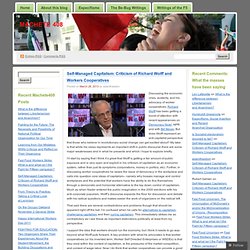
, NPR and with Bill Moyer. But does Wolff represent an anti-capitalist perspective that those who believe in revolutionary social change can get excited about? My take is that while his views represents an important shift in public discourse there are some major weaknesses and in what he presents and which I hope to explore briefly. I’ll start by saying that I think it’s great that Wolff is getting a fair amount of public exposure and is very open and explicit in his criticism of capitalism as an economic system, rather than just its symptoms (corporations, money in politics, etc).
That said there are several contradictions and problems though that should be apparent right off the bat. I support the idea that workers should run the economy, but I think it needs to go way beyond what Wolff puts forward. This Way Out. How Worker-Owned Companies Work. Truthout needs your support to produce grassroots journalism and disseminate conscientious visions for a brighter future.
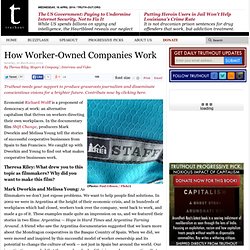
Contribute now by clicking here. (Photo: Paul Gibson / Flickr)Economist Richard Wolff is a proponent of democracy at work: an alternative capitalism that thrives on workers directing their own workplaces. In the documentary film Shift Change, producers Mark Dworkin and Melissa Young tell the stories of successful cooperative businesses from Spain to San Francisco. We caught up with Dworkin and Young to find out what makes cooperative businesses work. Theresa Riley: What drew you to this topic as filmmakers? The Economy: Under New Ownership by Marjorie Kelly.
How cooperatives are leading the way to empowered workers and healthy communities. posted Feb 19, 2013 Employees at Equal Exchange, the oldest and largest fair-trade coffee company in the nation.
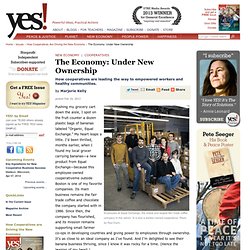
It is also a worker-owned cooperative. Photo by Paul Dunn. Pushing my grocery cart down the aisle, I spot on the fruit counter a dozen plastic bags of bananas labeled “Organic, Equal Exchange.” I happen to know a bit more than the average shopper about Equal Exchange, because I count myself lucky to be one of its few investors who are not worker-owners. Maneuvering my cart toward the dairy case, I search out butter made by Cabot Creamery, and pick up some Cabot cheddar cheese. At the checkout, I hand over my Visa card from Summit Credit Union, a depositor-owned bank in Madison, Wis., where I lived years ago. On my way home, I pull up to the drive-through at Beverly Cooperative Bank to make a withdrawal.
Something is dying in our time. Why Unions Are Going Into the Co-op Business by Amy Dean. “Too often we have seen Wall Street hollow out companies by draining their cash and assets and hollow out communities by shedding jobs and shuttering plants,” said United Steelworkers (USW) President Leo Gerard in 2009.

“We need a new business model that invests in workers and invests in communities.” Gerard was announcing a formal partnership between his 1.2-million-member union and Mondragon, a cluster of cooperatives in the Basque region of Spain. Mondragon employs 83,000 workers in 256 companies. About half of those companies are cooperatives, and about a third of Mondragon’s employees are co-op members with an ownership stake in their workplace. Mondragon companies do everything from manufacturing industrial machine parts to making pressure cookers and home appliances to running a bank and a chain of supermarkets.
Building union co-ops As manufacturing in the United States continues in free fall, the USW is working to bring the Mondragon cooperative model to the Rust Belt. Cooperantics. The Economy: Under New Ownership by Marjorie Kelly. Cooperatives and Solidarity Economics. A New Era in Finance. 6 Ways to Fuel the Cooperative Takeover by Sven Eberlein. From now on, the global mantra for filling market gaps is going to be, “There’s a co-op for that.”
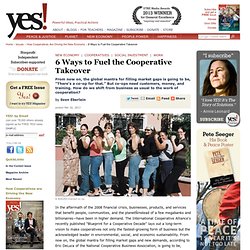
But co-ops need customers, money, and training. How do we shift from business as usual to the work of cooperation? Posted Mar 20, 2013 In the aftermath of the 2008 financial crisis, businesses, products, and services that benefit people, communities, and the planetÑinstead of a few megabanks and billionaires—have been in higher demand. The International Cooperative Alliance's recently published "Blueprint for a Cooperative Decade" lays out a long-term vision to make cooperatives not only the fastest-growing form of business but the acknowledged leader in environmental, social, and economic sustainability. 1. Where do you get the money to finance a new co-op? The National Cooperative Bank (NCB) has become a leading funder for new housing, business, and consumer cooperatives.
McKusker's Market photo courtesy of Franklin Community Co-op. 2. 3. 4. Arizmendi Bakery photo by Tony Nguyen. 5. 6.